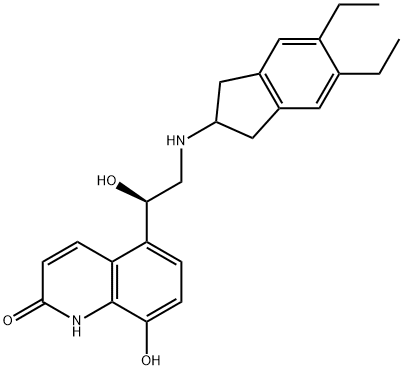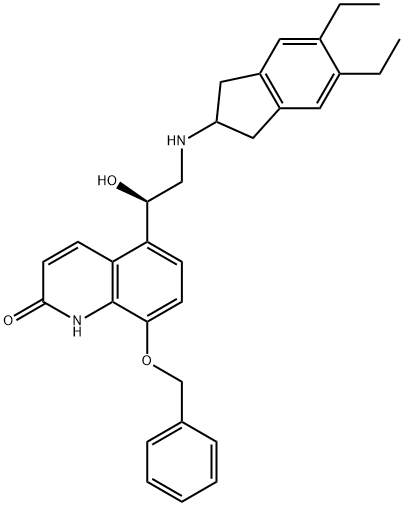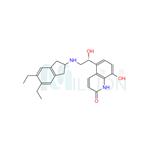Description
Indacaterol is a new, ultra-long-acting, rapid onset β(2)-adrenoceptor agonist that was developed by Novartis. The drug is used in managing and controlling chronic obstructive pulmonary disease (COPD) and asthma. The European Medicines Agency (EMA) approved indacaterol as a drug in 2009 under the Onbrez trade name while in the United States the Food and Drug Administration approved it under the trade name Arcapta in 2011. The drug is manufactured as its maleate salt form. Also, indacaterol is a chiral molecule; however, only the pure R-enantiomer is distributed.
Indication
Indacaterol is used in the maintenance of airflow obstruction in individuals with COPD for the long term, including emphysema and chronic bronchitis.
Mechanism of Action
By stimulating the adrenergic beta-2-receptors in the airways’ smooth muscles, indacaterol is able to cause relaxation, thus augmenting the diameter of the airways that are normally constricted in COPD and asthma. Because of its high affinity to the lipid draft domains in the membrane of the airways, it is long acting, therefore it slowly detaches from the receptors. It is rapid acting due to its high intrinsic characteristic.
Toxicity
In case of an overdose of indacaterol, the expected signs and symptoms include excessive beta-adrenergic stimulation, hypotension, hypertension, nervousness, fatigue, hyperglycaemia, insomnia, and metabolic acidosis.
Description
Inhaled β2 adrenoceptor agonists are effective in the management of
asthma and COPD, primarily through their bronchodilating properties.
These drugs induce bronchodilation by causing direct relaxation of airway smooth muscle through activation of adenylate cyclase, which in
turn increases intracellular cAMP levels.
Indacaterol is the
newest β2 agonist to reach the market. It is an ultra-long-acting agent
with a duration of action suitable for once-a-day dosing. Indacaterol is
supplied as an aerosol formulation of its maleate salt and is administered
via a dry powder inhaler device.
It is specifically approved for once-daily
maintenance treatment of airflow obstruction in adult patients with
COPD. In preclinical models, indacaterol is close to a full agonist at the
human b2 adrenoceptor (Emax = 73 ± 1% of isoprenaline′s maximal
effect, pEC
50 = 8.06 ±0.02) while salmeterol displays only partial efficacy
(38 ±1%). The functional selectivity profile of indacaterol over β1 human
adrenoceptors is similar to that of formoterol, whereas its β3 adrenoceptor selectivity profile is similar to that of formoterol and salbutamol.
Originator
Novartis (United Kingdom)
Uses
Indacaterol is a β-adrenoreceptor agonists for treatment of asthma and bronchodilator treatment for patients with chronic obstructive pulmonary diseases.
Definition
ChEBI: A monohydroxyquinoline that consists of 5-[(1R)-2-amino-1-hydroxyethyl]-8-hydroxyquinolin-2-one having a 5,6-diethylindan-2-yl group attached to the amino function. Used as the maleate salt for treatment of chronic obstructive pulmonary di
ease.
brand name
Onbrez Breezhaler
Side effects
The most commonly reported adverse events associated
with indacaterol treatment were nasopharyngitis, upper respiratory
tract infection, and headache and cough following inhalation. Adverse
events were mild or moderate in most cases, and became less frequent
with continued treatment.
Synthesis
The chemical synthesis of indacaterol begins
with a-chlorination of 5-acetyl-8-benzyloxy-2-quinolone with benzyltrimethylammonium
dichloro-iodate. The resultant chloroketone is
reduced with borane in tetrahydrofuran in the presence of the chiral
boron catalyst R-tetrahydro-1-methyl-3,3-diphenyl-1H,3H-pyrrolo[1,2c][
1,3,2]oxazaborole to produce the corresponding chlorohydrin intermediate
in high enantiomeric excess. The chlorohydrin intermediate is
cyclized to the corresponding epoxide by treatment with potassium
carbonate, the epoxide is condensed with 5,6-diethylindan-2-amine,
and the benzyl protecting group is removed by hydrogenolysis to
produce indacaterol. The 5,6-diethylindan-2-amine intermediate is
derived from 1,2-diethylbenzene via Friedel-Crafts acylation
with 3-chloropropionyl chloride, cyclization of the resultant 3-chloro-
1-(3,4-diethylphenyl)-1-propanone by means of concentrated sulfuric acid to 5,6-diethylindan-1-one, oximation with butyl nitrite, and reduction
of the oxime to an amine via treatment with hydrogen over palladium-
carbon.





